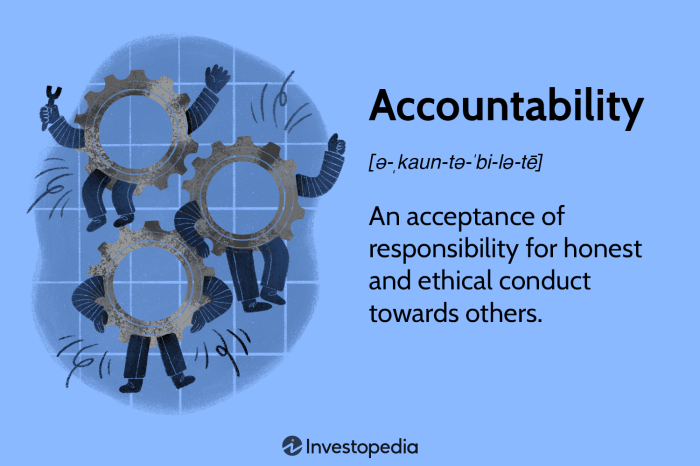Dive into the world of financial accountability where honesty meets finance in a dance of transparency and trust. From defining what it means to exploring tools for enhancement, this journey promises to enlighten and empower.
As we unravel the layers of financial accountability, we discover its significance in both personal and business finance, paving the way for better financial management practices and a stronger foundation for trust.
Definition of Financial Accountability

Financial accountability refers to the responsibility of individuals or organizations to manage their financial resources in a transparent and trustworthy manner. It involves keeping accurate records, following financial regulations, and being answerable for financial decisions.
Examples of Financial Accountability
- Regularly updating financial statements to reflect the current financial position.
- Implementing internal controls to prevent fraud and mismanagement of funds.
- Seeking approval for significant financial transactions from relevant stakeholders.
Importance of Financial Accountability
Financial accountability is crucial for maintaining the trust of investors, creditors, and other stakeholders. It ensures that financial information is reliable and can be used to make informed decisions. Without financial accountability, there is a risk of financial mismanagement, fraud, and loss of credibility.
Principles of Financial Accountability
Financial accountability is crucial for ensuring transparency and trust in financial management. It involves the responsible stewardship of resources and adherence to key principles that guide ethical decision-making.
Key Principles
- Transparency: Providing clear and accurate financial information to stakeholders.
- Responsibility: Taking ownership of financial decisions and actions.
- Integrity: Acting honestly and ethically in all financial dealings.
- Compliance: Following laws, regulations, and organizational policies.
Accountability and Ethics
Financial accountability is closely linked to ethics and integrity in financial decision-making. When individuals and organizations uphold ethical standards and act with integrity, they are more likely to demonstrate accountability in their financial practices. This helps build trust with stakeholders and promotes a positive reputation.
Preventing Fraud and Mismanagement
Adhering to financial accountability principles can help prevent fraud and financial mismanagement. By ensuring transparency, responsibility, integrity, and compliance, organizations can establish strong internal controls and processes that reduce the risk of fraudulent activities. Accountability also encourages proper oversight and monitoring, making it easier to detect and address any issues promptly.
Tools and Strategies for Enhancing Financial Accountability
Financial accountability can be greatly enhanced through the use of various tools, technologies, and strategies that help individuals and organizations effectively track financial transactions, promote transparency, and improve overall accountability.
Software and Technologies for Tracking Financial Transactions
Using specialized accounting software such as QuickBooks, Xero, or FreshBooks can streamline the process of recording and categorizing financial transactions. These tools provide real-time insights into income and expenses, making it easier to track financial activities and identify any discrepancies.
Role of Audits and Financial Reports
Regular audits conducted by internal or external auditors play a crucial role in ensuring financial accountability. Audits help verify the accuracy of financial records, detect fraud or errors, and provide stakeholders with assurance that financial information is reliable. Financial reports, such as balance sheets and income statements, also contribute to transparency by presenting a clear picture of an organization’s financial health.
Best Practices for Improving Financial Accountability
– Implementing segregation of duties to prevent fraud and errors.
– Establishing clear financial policies and procedures for consistent practices.
– Conducting regular reconciliations of bank statements and financial records.
– Training staff on financial accountability and reporting requirements.
– Engaging stakeholders in financial decision-making processes to foster transparency and accountability.
Challenges and Solutions in Maintaining Financial Accountability
Maintaining financial accountability can be a challenging task, especially in the face of various obstacles that organizations may encounter. However, by identifying these challenges and implementing effective strategies, it is possible to ensure financial accountability and safeguard the financial health of an organization.
Common Challenges Faced in Maintaining Financial Accountability
- Inadequate record-keeping: Poor documentation and record-keeping practices can lead to inaccuracies and discrepancies in financial reporting.
- Lack of transparency: When financial information is not readily accessible or understandable, it can hinder accountability and trust.
- Budget constraints: Limited financial resources may make it difficult to implement proper financial controls and oversight.
Strategies for Overcoming Obstacles to Financial Accountability
- Implement robust internal controls: Establishing clear policies and procedures can help prevent fraud and errors in financial transactions.
- Invest in training and education: Providing financial literacy training to staff members can enhance their understanding of financial processes and responsibilities.
- Utilize technology: Implementing financial management software can streamline processes and improve accuracy in financial reporting.
Implications of Lacking Financial Accountability in Different Contexts
- Non-profit organizations: Without financial accountability, donors and stakeholders may lose trust, leading to decreased funding and support.
- Government agencies: Lack of financial accountability can result in mismanagement of public funds and potential legal repercussions.
- Businesses: Poor financial accountability can lead to financial losses, damaged reputation, and regulatory penalties.
